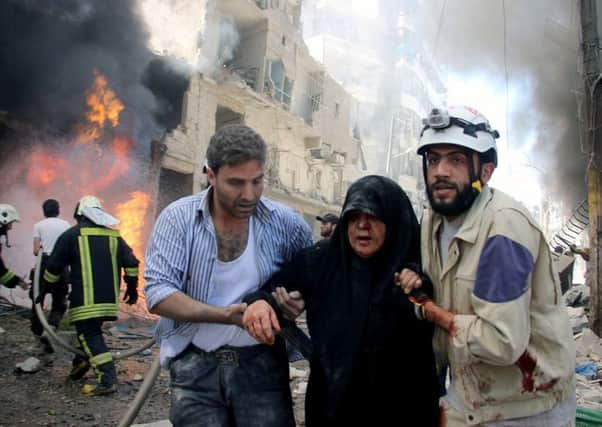Leaders: Time to step up our efforts on Syria crisis


The Syrian refugee crisis is one of the worst humanitarian crises in living memory. The brutal Assad regime and those opposed to his rule battle it out, while jihadist militants from the Islamic State also wage a civil war which has displaced more than 11 million people and destroyed countless homes.
The death toll for ordinary Syrians has exceeded 250,000 over the past four years, since the conflict began during a near-forgotten Arab Spring in March 2011 with anti-government demonstrations. What has become a “civil war within a civil war” means there are no safe havens within Syria, leaving a population determined to flee at all costs.
Advertisement
Hide AdAdvertisement
Hide AdThis mass of humanity seeking basic human rights of food, shelter and dignity - estimated at 4.5 million people who have fled Syria - includes a majority of vulnerable women and children.
The words of Mariam Akash, a Syrian mother-of-nine whose husband was killed by a sniper, resonated with many when she said: “We’re just living on the edge of life. We’re always nervous, we’re always afraid.”
However, the refugee problem is further heightened by the dangerous element that some of these people posing as refugees might actually be seeking to do us harm.
But that should not stop us for trying to help. Angela Merkel has shown the way with her principled stance that Germany will keep on doing the right thing and reach out to as many refugees as it can. The German leader has not faltered, despite facing criticism and allegations that migrants and refugees are to blame for a spate of attacks in Germany.
A Commons Home Office select committee report shows that Scotland is doing more than its fair share, with two out of every five Syrians refugees in the UK housed in Scotland, and that befits Scotland’s attitude towards migrants in general and helping others.
The same report slates the UK for not doing enough, and flags up the lingering and outstanding issue of the numbers of unaccompanied children to be admitted, calling for previously agreed commitments to be honoured.
“It is clear that there are many people in these camps entitled to humanitarian protection or refugee status, including some who should have their claims processed in the UK,” the report states.
There has been plenty of time to get this right and get the appropriate systems in place.
Advertisement
Hide AdAdvertisement
Hide AdBut still the attitude that the refugee camps, whether at Calais or in countries such as neighbouring Turkey and Jordan, have basically little to do with us, seems to prevail.
The Brexit referendum focused attention on “incomers” arriving on our “island nation” as well as a host of issues centred round the economic advantages or otherwise of being part of the European Union or not.
The referendum result cannot be about standing back and saying that this crisis is no longer our problem, turning our backs on those in need. EU member or not, Britain still needs to remain open to those fleeing war and repression.
Debate on policing is next step
The reassuring presence of uniformed police officers walking our streets, providing a feeling of security by their mere presence, is something that is welcomed by Scottish citizens.
Looking at the latest figures we see that officer numbers are at their lowest for five years and that the Scottish Police Federation claims the force is at “breaking point”.
We know the massive overhaul of Scotland’s eight police forces into Police Scotland in April 2013 – the UK’s second biggest force after the Metropolitan Police – was carried out primarily because of the cost savings it would generate.
But some operational benefits have been accrued such as merging competing CID and specialist units and having a simplified structure such as one national specialist crime division and specialist murder and serious crime squads giving the ability to put teams together for initiatives such as Operation Latisse tackling online child sex abuse. And recorded crime is at a 42-year low and the general trend is down.
Understandably, some people may take exception to being told crime across Scotland has fallen if a particular tranche of crime has increased in their local area.
Advertisement
Hide AdAdvertisement
Hide AdThere is also general suspicion of the merits of such centralisation given controversies such as the M9 tragedy when a couple lay undiscovered in their car for three days, the overuse of stop and search and concern over the number of armed officers on our streets.
But the number of police officers is not the only criteria on which to judge the effectiveness of a police force. There needs to be an open debate about what policing we want and how much we are willing to pay for it.